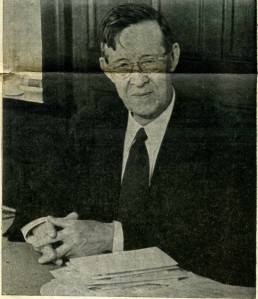On October 29, 1918, in the Veliko-Ustyug provincial newspaper Peasant and Workers Dumas, the famous “renunciation” of Pitirim Sorokin was published, in which he announced his resignation from the Socialist-Revolutionary party and renounced the title of member of the Constituent Assembly.
I am posting the text of the letter here, first in Russian; and also, in my own English translation. If any corrections are necessary in the translation, I would appreciate responses to that effect.
An English translation of Sorokin’s letter has not, to my knowledge, been published before.
— Roger W. Smith
Письмо в редакцию
«Крестьянские и рабочие думы»
Сим довожу до сведения граждан избирателей Воло-годской и Северо-Двинской губернии членов партии — с-р, что я: 1) отказываюсь от звания члена Учредит ельного собрания и всех прав и обязанностей, связанных с этим званием. 2) выхожу из состава партии соц иалистов-революционеров.
Основные мотивы, побудившие меня к этому шагу, таковы: 1) ввиду резко изменившихся, со времени выборов в Учред ительное собрание политических и социальных условий страны, а равно и политического настроения народа, я не могу считать себя правильным выразителем воли народа. 2) ввиду того же обстоятельства и чрезвы-чайной сложности современного внутригосударственного положения я затрудняюсь не только другим, но и самому себе указывать спасительные политические рецепты и брать на себя ответственное дело политического руко-водства и представительства народных масс.
При таких условиях каждый честный общественный деятель обязан сделать для себя надлежащий вывод, а именно: обязан отказаться от политики и прав и обязан-ностей политического работника. Этот отвод настоящим письмом я и делаю.
Сказанное объясняет и мой выход из партии соц иалистов-революционеров, раз я отказываюсь от всякой политической деятельности, то, естественно, я не могу состоять ни в какой политической партии, с одной стороны, числиться в партии мертвой единицей, с другой нести ответственность за ее политику.
К этим общественно-политическим мотивам должен еще присоединить мотив личного характера. Он состоит в моем горячем желании вернуться к прерванной чисто научной работе и к работе по культурному просвещению народа. Истекший год революции научил меня одной простой истине: политики могут ошибаться, политика может быть общественно полезной, но и может быть обще-ственно вредной, работа же в области науки и народного просвещения — всегда полезна и всегда нужна народу, в особенности же в эпохи коренного переустройства всей государственной и общественной жизни.
Этой работе, от которой на год с лишним я был оторван событиями и которую считал делом всей жизни, я отдаю отныне все свои слабые силы.
Приват-доцент Петроградского Университета и Психоневрологического Института, бывший член Учред ительного Собрания и бывший член партии с оциалистов-революционеров
Питирим Сорокин.
Letter to the editor
“Peasant and Workers’ Dumas”
I hereby inform the citizen voters of the Vologda and Severodvinsk provinces with party membership – s-r [Socialist-Revolutionary], that I: 1) renounce the title of member of the Constituent Assembly and all the rights and obligations associated with this title. 2) I quit the Socialist Revolutionary party.
The main motives which have prompted me to take this step are as follows: 1) in view of dramatic changes, since the elections to the Constituent Assembly, of the political and social conditions of the country, as well as the political mood of the people, I cannot consider myself a proper spokesman for the will of the people. 2) in view of the same circumstances and the extraordinary complexity of the current domestic situation, I find it difficult not only for others, but also for myself, to recommend salvific political recipes and take upon myself the responsible task of political leadership and representation of the masses.
Under such conditions, every honest public figure is obliged to draw the proper conclusion for himself, namely: he is obliged to renounce politics and the rights and duties of a political functionary. I am making that withdrawal by this letter.
The foregoing also explains my withdrawal from the Socialist Revolutionary party, since I renounce any political activity, then I cannot, naturally, be a member of any political party, considered a dead entity in the party on the one hand, while, on the other hand, bearing responsibility for its policies.
To these socio-political motives must be added a motive of a personal nature. It consists in my ardent desire to return to my interrupted purely scientific work and to work on the cultural enlightenment of the people. The past year of the revolution has taught me one simple truth: politicians can make mistakes, politics can be socially useful, but it can also be socially harmful, while work in the field of science and public education is always useful and always necessary for the people, especially in this time of radical transformation of all state and public life.
To this work, from which for more than a year I was torn away by events and which I considered the work of my whole life, I now give all my debilitated strength.
Privat-dozent of Petrograd University and the Psychoneurological Institute, former member of the Constituent Assembly and former member of the Socialist Revolutionary Party
Pitirim Sorokin.






